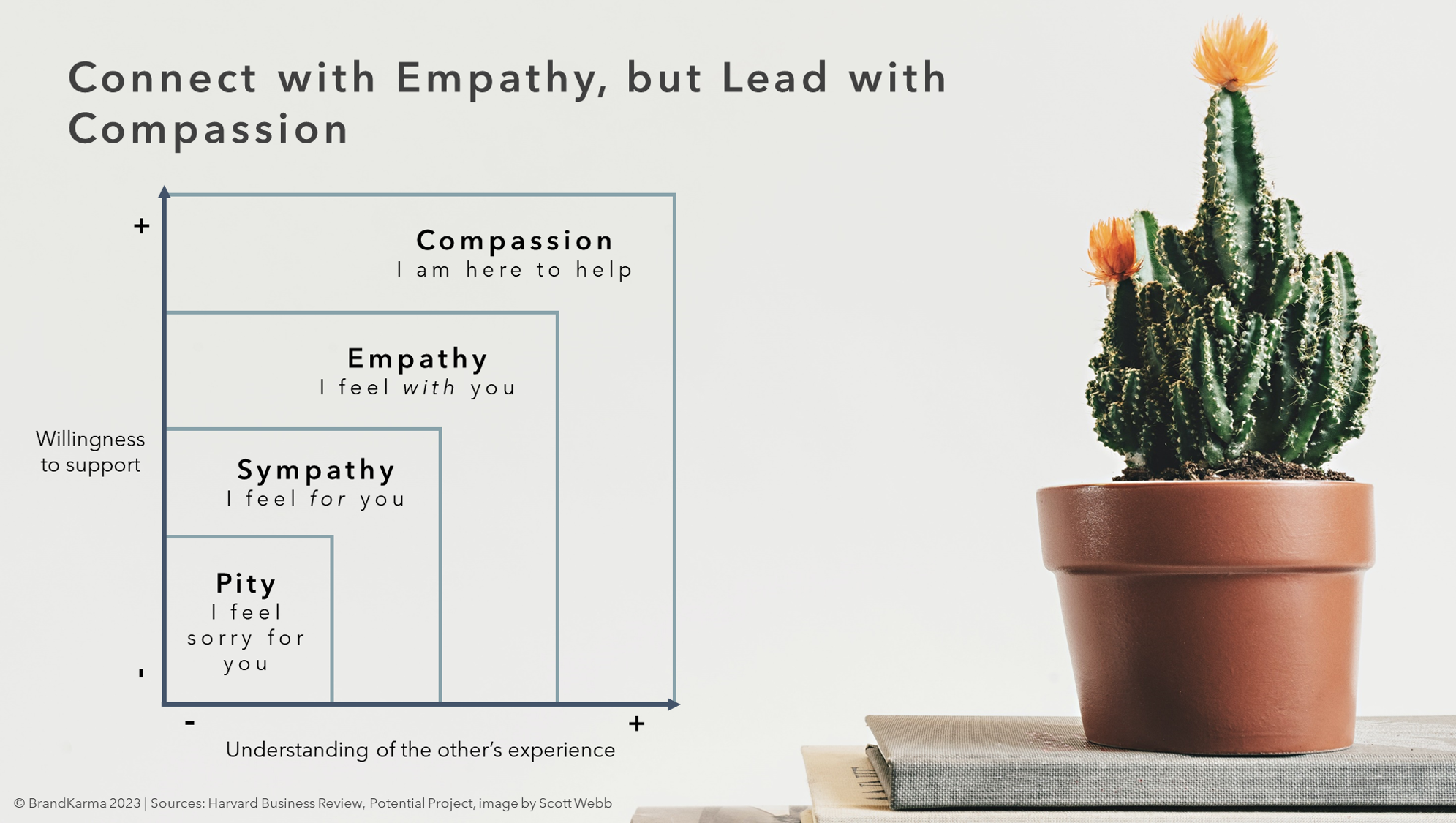The Power of Emotional Intelligence:
A Human-Centered Approach to Business
by Laura Modre and Eliot Mannoia // December 12, 2023
reading time: 9 minutes

© Singkham
The ideal of success is often associated with high intelligence and expertise. However, this view sidelines crucial elements that extend beyond someone’s technical competencies and knowledge and include interpersonal and intrapersonal skills, that is, emotional intelligence. Emotional intelligence (EQ) encompasses a range of skills that enable individuals to better understand and manage themselves and others, yielding positive results for their relationships, communication, empathy, and compassion. The power of EQ in business is undeniable as it enhances leadership capabilities, decision-making, motivation, adaptability and resilience, making it a catalyst for success. Therefore, businesses centering around both IQ and EQ not only foster environments of innovation and productivity, but a high level of EQ also enables them to place their stakeholders’ experiences at the core of operations and improvement. Particularly the continuing digital transformation requires high sensitivity to employees’ and customers’ needs. Businesses therefore need to make improving their stakeholders’ digital and non-digital experiences a top priority. To achieve this human-centric and compassionate approach, digital psychologists play a pivotal role in guiding emotionally intelligent transformation and making businesses more human. Importantly however, digital psychologists are also on a mission to increase EQ beyond the business sphere, for example in schools and medical associations, and to place humans, their needs and values at the center of all areas of life to shape a better, more empathetic and compassionate society.
Businesses are constantly striving to become more efficient, innovative, and successful. Particularly in today’s fast-paced, technology-driven world, companies and their leaders are under a lot of pressure to outperform their competitors, meet their organizational goals, and drive their businesses forward. In this pursuit of success and growth, too many times the focus on KPIs and other quantifiable outputs leaves the human element out of sight. Traditionally, IQ, that is, someone’s knowledge and their ability to reason and think critically is seen as the primary factor of success. Not surprisingly then, many companies tend to hire the “smartest” person in the room, particularly for leadership roles to improve the company’s performance. However, a more innovative approach to business and leadership was already introduced in the 1990s with the popularisation of the concept of “emotional intelligence”, or EQ, by Daniel Goleman. In this blog post, we’ll explore two key areas. First, we’ll examine the role of emotional intelligence in business. Then, we’ll discuss how digital psychologists can significantly boost emotional intelligence in society. Our focus will be on the successful integration of a human-centered approach in both business and technology.
Understanding Emotional Intelligence
Emotional intelligence can be seen as a set of skills and abilities that enable someone to better oneself and others and better manage one’s relationships. The concept refers to both intrapersonal and interpersonal understanding as a key to think and act in individually and mutually beneficial ways. EQ can be broken down into the following four skills:
-
- Self-awareness, e.g., knowing and effectively utilising one’s strengths and acknowledging and overcoming one’s weaknesses; recognising one’s own emotions and reactions to different situations
- Self-management, e.g., managing one’s emotions in stressful situations, shifting from emotional reaction to rational response and becoming more intentional in one’s actions and decisions
- Social awareness, e.g., recognizing other’s emotions and needs, paying attention to the dynamics of social interactions
- Relationship management, e.g., addressing issues in a constructive way to resolve conflicts; successfully working with other people through effective communication
Moreover, emotional intelligence can be seen as the foundation of a variety of other soft skills that are essential in both private and business relationships. They include communication, teamwork, problem solving, critical thinking, creativity, adaptability and leadership skills and refer to a range of character traits, personal values, and interpersonal skills that enable people to interact successfully with others.
Importantly, EQ is not simply a fixed, unchangeable skillset. Instead, it can be learned and improved through life experiences, including stress and trauma but also through practice, for example within formal workshops and trainings. Ultimately the personal pursuit of becoming more empathetic and compassionate and a desire to form more meaningful and manageable relationships will lead to the best results. A great place to start developing greater emotional intelligence is through self-reflection, therapy and self-awareness.
Unlocking the Power of Emotional Intelligence in Business
As seen above, emotional intelligence is a multi-faceted set of “soft skills” that can be seen as a catalyst in business success. Harnessing insights obtained through EQ enables businesses and their employees to enhance their performance due to more effective and intentional decision-making, higher motivation, adaptability, openness to learn, empathy, resilience to stress, and conscientiousness. A high level of EQ is particularly critical in leaders and managers as they can foster a culture of empathy, understanding, and open communication, which can lead to psychologically safer work environments. Importantly, Harvard Business Review highlights that positive and strong leadership extends beyond empathy, i.e., the emotional aspect of feeling with one’s employees but is furthermore reflected in compassion, which can be described as “the active intention to help others”.

© Scott Webb
As a result of empathetic and compassionate leadership, team members may feel more inclined and secure to share innovative ideas, take positive risks that may propel the organisation in new directions, and to be more aligned with the company, which leads to an overall increase in productivity. Clearly, emotional intelligence improves organisations in ways that would not necessarily be possible through IQ alone. EQ is therefore invaluable in business because it directly impacts how employees and leaders interact with each other, with the company and with other company stakeholders. It enables them to build successful and cooperative relationships, navigate conflicts, and exhibit effective leadership, which together have a profound impact for all stakeholders.
To underline the significance of emotional intelligence and its relationship to IQ, the World Economic Forum suggests that people with high emotional intelligence, but “average IQs outperform those with the highest IQs 70% of the time”. Furthermore, Harvard Business School reports that nowadays, meeting the formal requirements of a job posting is only seen as the baseline in hiring decisions, while emotional intelligence “is one of the most sought-after interpersonal skills in the workplace […] [with] 71 percent of employers valu[ing] emotional intelligence more than technical skills when evaluating candidates.”
It is important, however, to note that the goal of greater EQ within a business should not primarily be the enhancement of the company’s quantitative performance. Instead, the aim should also be to shift the overall organisation towards more emotional intelligence and human-centricity to improve the experiences for the people involved in and affected by the business. If businesses themselves become more human and have more empathy and compassion for their stakeholders, an increase in perceived psychological safety will boost collaboration and productivity within teams, as well as engagement and trust in customers, among many other benefits. Thus, emotionally intelligent companies not only have a more positive impact on their stakeholders, but they also reach their objectives and results more successfully and experience more overall success.

© Scott Webb
The Role of Emotional Intelligence and Digital Psychologists in Digital Transformation
The digital transformation is unstoppable and pervasive, seeping into every industry and area of business and life. Particularly during this time of innovation at a never-before-seen speed, possessing a high level of emotional intelligence is an invaluable asset in any person or leader to guide oneself and others through this era of rapid change. In our ever-changing work and social environments, with new technologies emerging daily, one’s emotional intelligence (EQ) becomes increasingly vital. It helps us navigate and overcome challenges empathetically and make informed, intelligent decisions. Especially the integration of new technologies and artificial intelligence within a business requires sensitivity to employees’ and customers’ needs and values. Emotional intelligence is therefore essential for leaders to give support and direction to their stakeholders, to lead by example, and provide opportunities for employees and customers to learn and adjust to the changes.
Digital psychologists help with these processes and emphasise EQ as an enabler for a successful integration and cooperation between humans and technology. By taking a holistic, human-centered, emotionally intelligent approach to digital transformation, they integrate insights from psychology, artificial intelligence, and technology to optimise business processes and communications through a variety of solutions, both technological and non-technological. Digital psychologists empathise with human needs and aim at improving their experiences and interactions with/in a company from a psychological perspective. They analyse employee or customer touchpoints and consider the various aspects of emotional intelligence to integrate these elements within the design and engineering of organisational processes and products. By encouraging companies to adopt a more human-centered approach, digital psychologists at BrandKarma aim at making businesses more emotionally intelligent and to improve the experiences for all stakeholders involved.
Making Society More Emotionally Intelligent
Lastly, digital psychologists at BrandKarma also offer workshops on emotional intelligence outside of the business world, for example, in schools or at medical associations. BrandKarma’s digital psychologists seek to make society as a whole more human by educating and training students and doctors among other professionals to enhance their soft skills and become more aware of their own and other’s emotions and experiences. The goal is to ignite better emotional intelligence in individuals and organisations in a variety of settings, domains, and industries because a truly human-centric society will be better equipped to face the challenges of its time in a valuable way.
As our founder Eliot puts it, “at BrandKarma, our mission is to cultivate higher emotional intelligence across society and the business world. This endeavor isn’t about being more emotional, but rather, developing a deeper understanding and management of emotions. Enhanced emotional intelligence leads to fewer emotional outbursts and a heightened ability to make rational decisions. Our focus is on minimizing negative emotions and amplifying positive ones, such as passion, to foster a more emotionally adept and resilient society.”
In conclusion, emotional intelligence helps to understand and anticipate not only one’s own emotions and needs, but also those of others. This is a vital aspect of propelling both business success and societal integration. Humanity should always remain at the heart of society, technology and business and increased emotional intelligence is a key pillar in that pursuit.
#brandkarma #digitalpsychologist #digitalhumanism #emotionalintelligence #business
Sources:
What is Business Emotional Intelligence?, EBW Global
The Importance of Emotional Intelligence in the Workplace, University Canada West
Why Emotional Intelligence is Important in Leadership, Harvard Business School Online
Emotional intelligence: What it is and why you need it, World Economic Forum
The impact of Emotional intelligence in the Digital Age, Psychology and Education
5 Essential Soft Skills to Develop in Any Job, Harvard Business Review
Connect with Empathy, But Lead with Compassion, Harvard Business Review
